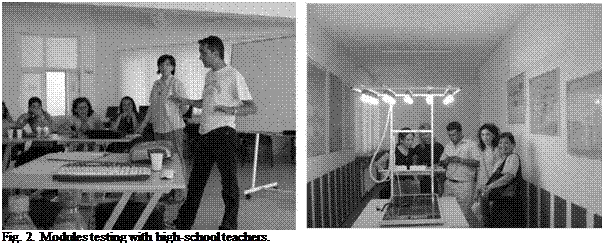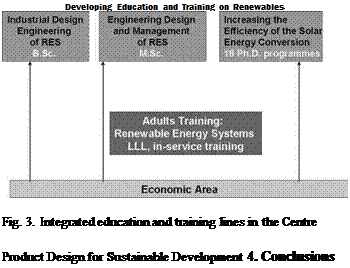Как выбрать гостиницу для кошек
14 декабря, 2021
 |
In order to assess the curriculum, and get the feed back from the teachers-trainees, testing sessions were proposed. Thus, the first form of the materials was tested in Brasov (Fig. 2), in June 2007 with high-school teachers from Turkey (11 persons, having different backgrounds: technical, scientific, humanities) and Romania (6 persons, having scientific and technical background), who were selected by the two school inspectorates. The lectures were delivered by teachers from Transilvania University of Brasov and College for Natural Sciences, Brasov. Seven modules of the in-service course were, thus, assessed: Fundamentals of energy production, Solar-thermal systems, Photovoltaic systems, Wind systems, Micro-hydro systems, Waste management, Waste water treatment.
The trainees were involved in several types of activities: traditional lectures, where the new scientific content was presented; in experimental sessions — they were involved in real active learning activities in laboratories from Transilvania University, focusing on renewable energy systems; project-based learning sessions — each teacher had to propose a lesson plan meant to design the appropriate learning environment dedicated to the knowledge and skills acquisition in the field of renewable energy, in the
frame of the own taught discipline. All the teachers positively appreciated the entire course;
The topics approached by the teachers were related to: wind energy systems, photovoltaic systems, solar-thermal systems, environment pollution. All the plans approached the traditional instructional method: teacher delivering the content, students trying to acquire the new content, followed by an evaluation sessions. No experimental activities were proposed, and the reason for this was the lack of experimental devices in their schools. Teachers mentioned that the subjects they proposed were new; they don’t have the opportunity to integrate them in their curriculum, but they can further introduce them in the quotidian instructional activity to provide contextual learning for the “normal” topics in the school curricula.
Thus, the modules testing revealed a strong need of appropriate teaching aids — a combination of a teaching manual, eLearning tools and practical kits.
The testing of the full course was performed in Transilvania University, between the 1st of November 2007 and the 30th of May 2008. A number of 18 high-school teachers (Technical, Physics and Chemistry background) from Brasov and Covasna counties attended the course, while the lecturers were given by teachers from four of the partners’ countries (Belgium, Greece, Germany, and Romania). The teachers were involved in the same type of instructional activities as the first group: traditional, experimental, project-based activity. The attendees’ final project is targeting the development of a project meant to introduce the topic of renewable energy in the pre-university curriculum. Their proposals are oriented in three directions:
• Topic of “renewables” as context for the subject in the existing curricula. For example, in scholar chemistry curricula, there is the “hydrogen”, “water” topic. For teaching this topic, the Chemistry teachers proposed problem-based activities focusing on Hydrogen Technology. The students are expected to understand the implementation of Hydrogen Technology with its advantages and disadvantages;
• Topic of “renewables” as specific subject in the existing curricula. For example, the Physics teachers proposed the “energy” topic to be presented in a new format, focusing on “renewables”;
• New topics in the curriculum. The pre-university curriculum offers the opportunity to propose new disciplines at the school decision. Thus, the teachers proposed in each area of the curriculum (Sciences and Technical areas) new disciplines, such as: “Energy Efficient House” (problem-based approach as teaching method), “Environmental pollution” (proposed by Chemistry teachers), “Energy and Environment” (multi-disciplinary approach among Physics, Chemistry, Geography teachers).
The real implementation of the teachers’ proposals will be in the 2008/2009 academic year and the results are expected in several years.
There are more opening expected: in the Transilvania University is running, starting with the academic year 2007/2008 the B. Sc. program Engineering of Renewable Energy Systems (4 years) already well attended by students. Preparing the teachers, in the high-schools, for teaching on renewables is expected to lead to a further increase in the pupils’ interest for further studying in this field. The B. Sc. course can be followed by the M. Sc. course Engineering Design and Management of Renewable Energy Systems (running starting with 2003) and various Ph. D. programmes in the Centre Product

Design for Sustainable Development. Thus the development of a complete education and training line is offered, addressing different levels of competence form a broad range of target groups.
The SEE EU Tool project provides an European frame for teachers’ in-service training on sustainable energy, mainly on renewable energy systems.
During the SEE EU Tool project a complex training kit for teachers in-service training have been developed in the partnership. The training kit contains: a course, teaching materials (containing content and teaching aids), experimental devices (and the suggested teaching aids).
The teachers from pre-university educational system are willing to participate at training courses in this field and they consider being very important for themselves and consequently for their students.
The need for adapting the curriculum and the course to the teachers’ competences and to the pupils’ level is fulfilled by a harmonized cooperation between the project partnership and the testing group — teachers from the partner countries.
After completing the course, the teachers found many opportunities to introduce the topic of renewable energy systems in the scholar curricula.
The course is integrated in a complete education and training line on renewables, developed in the Transilvania University of Brasov, the Centre Product Design for Sustainable Development.
References
[1] Environmental Education Materials: Guidelines for Excellence Workbook — Bridging Theory and Practice, North American Association for Enviornmental Education, 2000.
[2] G. Steiner, A. Posch Journal of Cleaner Production, 14 (2006), pp. 877-890.
[3] SEE EU Tool project website http://www. unitbv. ro/Default. aspx? tabid=561
[4] I. Visa, A. Duta, D. Perniu, International Conference on Trends in Environmental Education, EnvEdu (2006), Brasov, Romania